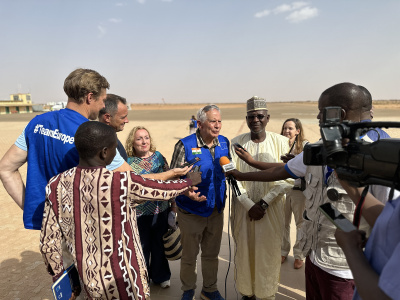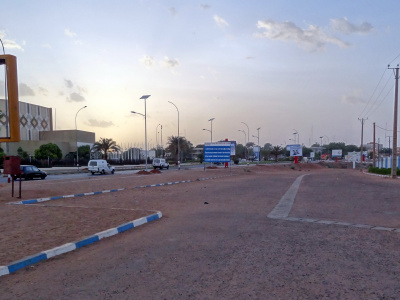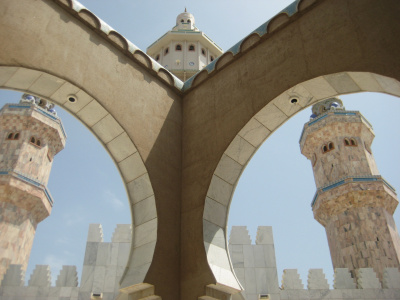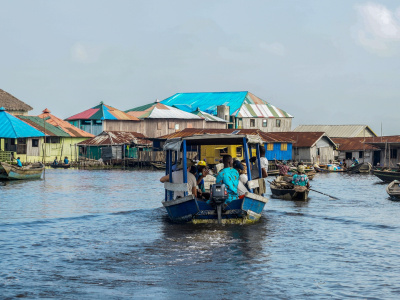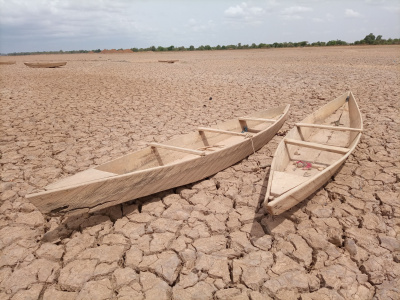
From Niger’s coup to the Sahel’s jihadist threat: A complex path ahead for the EU
Niger's recent coup has taken Western nations by surprise, exacerbating instability in the Sahel. This unfolding scenario has created a potential opening for jihadist groups within the region to amplify their influence. As we look ahead, the European Union (EU) faces a critical decision: recalibrate its strategy or persist with its liberal peace agenda and well-trodden path of hard security measures.
Niger’s coup: Unravelling the hidden discontent
The coup in Niger received significant international attention, but wasn't entirely unexpected locally. This fifth successful coup in the history of the country stresses long-simmering issues that signal discontent among Nigeriens. Allegations of fraud and, at times, violent protests marred the 2020-2021 electoral process, and restrictions on civil liberties further diminished transparency and gender equality. In 2021, 52% of Nigeriens believed the country was headed in the wrong direction.
While the deposed government of Mohamed Bazoum was a notable US and EU security ally, the junta's actions found support among a portion of the population. A recent study, based on the 2022 Afrobarometer survey conducted in Niger, revealed that 69% of Nigeriens agreed with the statement: “It is legitimate for the armed forces to take control of government when elected leaders abuse power for their own ends."
The coup in Niger received significant international attention, but wasn't entirely unexpected locally.
This figure indicates a crucial point: many Nigeriens are open to considering alternative forms of governance, even if it entails a military takeover. A significant portion of the population is primarily concerned about daily necessities such as access to food, water, healthcare and safety and is less attached to a specific political structure.
With the junta in power, Niger is grappling with instability and continues to face the threat of jihadi expansion – a threat that Bazoum’s government then promised to curtail and the junta now used to justify its actions. This new instability presents an unsettling opportunity for regional and local jihadist groups to expand their influence in Niger, strategically located in the Sahel.
The escalating threat of jihadist groups
The turbulence following the coup has opened a strategic window of opportunity for Salafi-jihadi groups, capitalising on Niger's well-acknowledged geographical significance in the Sahel. On 15 August, two weeks after the coup, the Islamic State in Sahel Province (ISSP) targeted three villages in the Tillabéri area, resulting in the tragic loss of at least 50 civilians.
Simultaneously, Jama'at Nusrat al-Islam wal-Muslimin (JNIM), affiliated with Al-Qaeda, ambushed a military convoy near Kotougou, which claimed the lives of 17 soldiers. This resurgence in attacks has prompted concerns over the new junta's ability to contain the jihadi threats in border regions.
Multiple jihadist group hotspots are present along the country's borders, compounding concerns for the nation's stability and security. Marked by the recent attacks, the Liptako-Gourma region, spanning Mali, Niger and Burkina Faso, has emerged as a focal point for extremist activities.
Further south, the tri-border region encompassing Niger, Mali and Benin, and notably the W Regional Park, has transformed into a stronghold for factions like Ansarul Islam and JNIM-affiliated Katibat Macina. The Lake Chad Basin region, situated at the tri-border junction of Niger, Nigeria and Chad, has been under Boko Haram’s splinter groups’ control, illustrating the complex challenges posed by jihadist groups across these strategically significant territories.
In these regions, Al-Qaeda and Islamic State (IS) factions are locked in a persistent conflict, engaged in an ongoing rivalry for supremacy. These various extremist groups have forged a complex web of conflicts and ever-shifting alliances, with IS groups steadily gaining traction across different zones. If they were to gain the upper hand, they could reach into the Gulf of Guinea countries, gaining access to maritime routes and potentially triggering a more widespread surge in extremist activities throughout the region.
IS groups see the current crisis as an opportunity to establish a strategic corridor linking the Lake Chad basin to the broader Sahel region, effectively connecting its various branches (such as ISSP and ISWAP, the Islamic State in West Africa Province). This would facilitate the movement of IS military leaders, fighters and jihadist recruits, as well as illicit trade, ultimately bolstering the IS groups’ influence across the Sahel.
Niger is strategically positioned for these groups, serving as a conduit for arms trafficking. Several arms trafficking routes run from Libya into both the Sahel region and the broader West African area through Niger, as outlined on the map below.

The absence of stability in the country can increase recruitment and radicalisation, as these groups often garner local support by positioning themselves as alternatives to the state, offering a semblance of stability and resources. These far-reaching consequences affect not just Niger but also the entire Sahel region. It also has implications for the EU and France, which maintained robust relationships with Bazoum’s government, hosted French and US military bases and engaged in extensive security cooperation, particularly on counter-terrorism.
The absence of stability in the country can increase recruitment and radicalisation, as these groups often garner local support by positioning themselves as alternatives to the state, offering a semblance of stability and resources.
The EU's evolving engagement in the Sahel
For a decade, the EU had been a steadfast partner for Niger, investing a substantial €600 million in civilian and military missions across the Sahel. This year only, the EU initiated a military training mission, EUMPM Niger, with a budget of €27 million. However, the recent coup in the supposedly democratic and stable Niger sent shockwaves through the EU and its member states, prompting a re-evaluation of its engagement strategy in the region.
Niger’s relationship with France, a prominent player in the region, has become particularly strained after the coup. This follows rising anti-French sentiment both at government and population levels in Niger and the broader Sahel region. Just like in Mali in 2021, the Nigerien military terminated agreements with France, calling for the withdrawal of the French ambassador and the French military.
French president Emmanuel Macron rejected these measures, deeming them null and illegitimate and stressing that the only decision-maker in the country remains the detained Bazoum. Recently, the military junta accused France of orchestrating a potential military intervention by deploying its forces across various countries in the Economic Community of West African States (ECOWAS), notably Benin. In response, Niger has mobilised military personnel along its borders and joined a security pact with Burkina and Mali in a new Liptako-Gourma alliance.
In this context of high tensions, EU member states seem to struggle to align their positions. Following the coup, the EU suspended all aid to Niger, and EU foreign policy chief Josep Borrell expressed support for France and its decisions. However, certain member states, such as Denmark, resumed humanitarian aid to Niger, while Spain emphasised the significance of supporting the Sahel region and strengthening ties with Africa.
In the future, a strong and cohesive strategy for Africa and the Sahel will be crucial, as emphasised by European Commission president Ursula von der Leyen. Plans for a new civil-military mission in the Gulf of Guinea, driven by the increasing threat posed by jihadist groups in the region, appear as a response rooted in security measures. This mission, which received approval in August, entails the deployment of both police and soldiers to countries such as Ghana, Togo, Benin and Côte d’Ivoire. Its formal launch is pending approval from EU foreign ministers this autumn.
However, the escalating tensions in the region give rise to concerns of a potential crisis, possibly indicating a continuation of the liberal peace agenda and the hard security approach without drawing lessons from experiences in Mali.
Preferably, the EU should adjust its strategy and engage in dialogue with the junta to prioritise an effective fight against jihadist groups without making security support conditional on an immediate return to democracy. This approach would prioritise security assistance while de-escalating tensions related to democracy, potentially leading to a more nuanced and effective engagement in the region. It may also involve altering engagement methods. This includes exploring possibilities for engagement with religious actors embedded in local communities to counter the influence of jihadist groups and adopting a human security approach that addresses socio-economic grievances.
European policymakers must decide whether to prioritise counter-terrorism efforts and whether the potential ramifications in Europe justify a shift in their Sahel strategy.
Considering the significant territorial control gained by jihadists across the region, European policymakers face a challenging dilemma. They must decide whether to prioritise counter-terrorism efforts and whether the potential ramifications in Europe justify a shift in their Sahel strategy. Embracing such a strategic shift, even if it means deviating from the EU's long-standing commitment to the liberal peace agenda, could yield significant positive outcomes. However, it would necessitate a profound understanding of the intricate socio-economic and political dynamics affecting Nigeriens and the broader Sahel populations.
The views are those of the author and not necessarily those of ECDPM.



